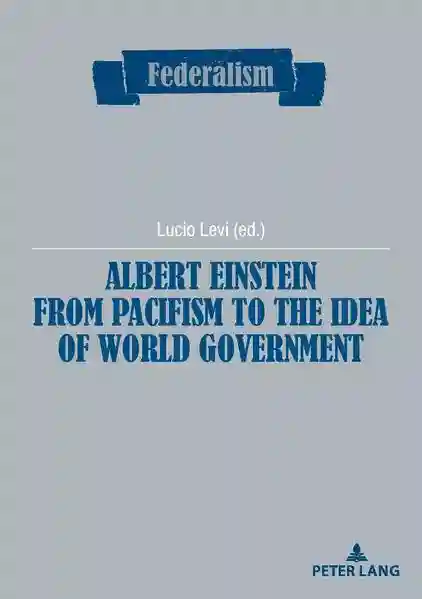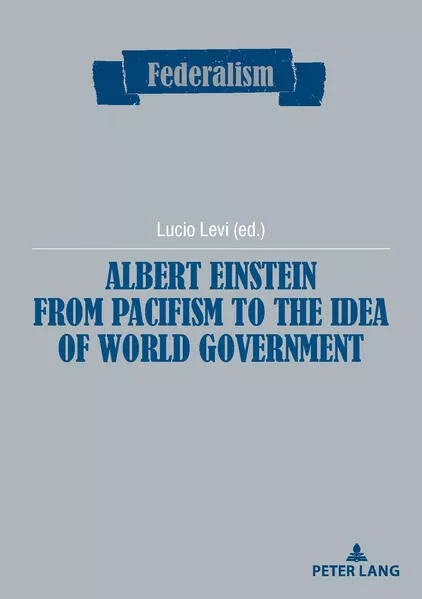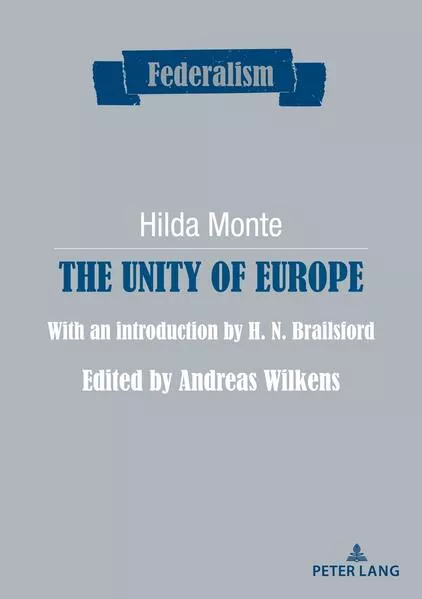Chronologie aller Bände (1 - 2)

Die Reihenfolge beginnt mit dem Buch "Albert Einstein from Pacifism to the Idea of World Government". Wer alle Bücher der Reihe nach lesen möchte, sollte mit diesem Band von Lucio Levi beginnen. Die Reihe umfasst derzeit 2 Bände. Der neueste Band trägt den Titel "The Unity of Europe".
- Anzahl der Bewertungen für die gesamte Reihe: 0
- Ø Bewertung der Reihe: 0
- Start der Reihe: 06.05.2022
- Neueste Folge: 31.07.2023
Diese Reihenfolge enthält 2 unterschiedliche Autoren.
- Band: 12
- Autor: Levi, Lucio
- Anzahl Bewertungen: 0
- Ø Bewertung:
- Medium: Buch
- Veröffentlicht: 06.05.2022
- Genre: Politik
Albert Einstein from Pacifism to the Idea of World Government
Albert Einstein was one of the initiators of the peace movement in Europe in the early twentieth century. He tirelessly denounced the imperfections of society due to the primitive institution of war and devoted his energies to outlawing war. After Hitler’s rise to power, he abandoned pacifism and instead embraced a federalist vision according to which the root cause of war lies in the division of the world into sovereign states and the vehicle of peace is world government.
This book explores Einstein’s outlook on war and peace and traces the evolution of his thinking on these topics. In particular, Einstein developed a dialogue on war and peace with physicists like Bohr, Planck and Szilard as well intellectuals like Dewey, Freud, Gandhi, Mann, Mumford, Rolland Russell, Schweitzer and Tagore. The key concepts that were the focus of these discussions were the cause of war (included the Einstein–Freud debate on psychological and political causes of war) and the means to prevent it; the distinction between antimilitarism, pacifism, internationalism and federalism; and the dividing line between intergovernmental and supranational organizations.
This book explores Einstein’s outlook on war and peace and traces the evolution of his thinking on these topics. In particular, Einstein developed a dialogue on war and peace with physicists like Bohr, Planck and Szilard as well intellectuals like Dewey, Freud, Gandhi, Mann, Mumford, Rolland Russell, Schweitzer and Tagore. The key concepts that were the focus of these discussions were the cause of war (included the Einstein–Freud debate on psychological and political causes of war) and the means to prevent it; the distinction between antimilitarism, pacifism, internationalism and federalism; and the dividing line between intergovernmental and supranational organizations.
- Band: 15
- Autor: Monte, Hilda
- Anzahl Bewertungen: 0
- Ø Bewertung:
- Medium: Buch
- Veröffentlicht: 31.07.2023
- Genre: Politik
The Unity of Europe
She was young, a determined fighter against Nazism in Germany; she was an independent socialist, a tireless writer against hatred and war; and she was an extremely courageous woman. All this would be enough to secure Hilda Monte a prominent place in the history of resistance to barbarism in 20th century Europe. Furthermore, she designed a project for a federal Europe that remains unparalleled. Among the many proposals for the future European peace, this one stands out. She edited her project in October 1943 with the renowned London publisher Victor Gollancz.
Her plea: for European countries to finally put an end to the "old game of sovereignty". Lasting peace and economic development required a genuine "European revolution": solidarity throughout Europe, common federal structures, based on a shared history and the common values of humanism. She was aware that this path would be a difficult one.
Hilda Monte was born in Vienna in 1914, grew up in Berlin and wrote her first newspaper articles against the rise of Hitler when she was 17. In 1933 she witnessed the "seizure of power" in Berlin. Exile in Paris and London followed. But Hilda Monte wanted to do more than just write against Nazism, and so she undertook dangerous trips to Germany. On 17 April 1945, while returning from a mission "on the ground" for the Austrian resistance, which she considered an act of European solidarity, she was shot and killed on the border near Feldkirch. Her treatise "The Unity of Europe", newly published here, is the lasting legacy of an eminent European resistance fighter.
Her plea: for European countries to finally put an end to the "old game of sovereignty". Lasting peace and economic development required a genuine "European revolution": solidarity throughout Europe, common federal structures, based on a shared history and the common values of humanism. She was aware that this path would be a difficult one.
Hilda Monte was born in Vienna in 1914, grew up in Berlin and wrote her first newspaper articles against the rise of Hitler when she was 17. In 1933 she witnessed the "seizure of power" in Berlin. Exile in Paris and London followed. But Hilda Monte wanted to do more than just write against Nazism, and so she undertook dangerous trips to Germany. On 17 April 1945, while returning from a mission "on the ground" for the Austrian resistance, which she considered an act of European solidarity, she was shot and killed on the border near Feldkirch. Her treatise "The Unity of Europe", newly published here, is the lasting legacy of an eminent European resistance fighter.

